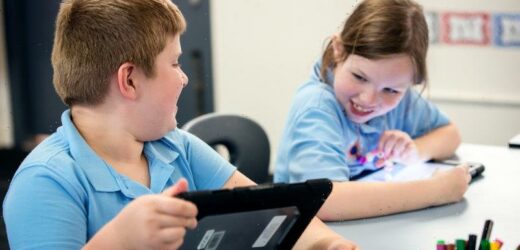Tech giant Apple is embedding itself in Australian schools, accrediting “Apple teachers” and awarding its most devoted schools “distinguished” status, in a move one expert says risks distorting established recognition of teaching expertise.
Apple has awarded almost 50 schools in Australia “Apple distinguished school” status, for demonstrating the company’s “vision for learning with technology”. Teachers out to gain Apple teacher accreditation must complete online modules that prove their proficiency with Apple products.
Students at Warringa Park School in Hoppers Crossing, one of almost 50 ‘Apple distinguished schools’ in Australia.
Prerequisites for achieving distinguished school status include that all students use Apple technology for learning, that the Apple platform is used in innovative ways and that staff are proficient with devices such as iPads and Mac computers.
The influence of Apple on Australian education is being studied in a federally funded project led by Australian Catholic University research fellow Dr Steven Lewis.
Lewis said Apple was muscling in on more conventional professional development bodies such as universities and “asserting its own role to authorise teacher expertise”.
“Apple, a for-profit entity and the world’s largest information technology company by total revenue, now stands to exert an unprecedented global influence on teacher professional learning and credentialing,” he said.
He said it is potentially dangerous to rely on a technology company such as Apple to provide professional learning for teachers.
“We now see these same companies directly influencing how teacher knowledge and expertise is determined, valued and practised,” he said.
Six Apple distinguished schools in Victoria include three government primary schools, one government secondary school, one Catholic primary school and a government special school.
Jacqui Luscombe, a senior teacher at Emmaus Catholic Primary School in Mount Helen, near Ballarat, said the school’s accreditation raised its profile in the region. Its staff, all of whom are Apple teachers, have been invited to present at technology conferences about how they use Apple for education.
“For us, it’s a way to promote our school in a positive way, and then for Apple it’s an incentive for them to be promoting their products as well.”
Luscombe said the school was mindful to use technology in the most creative way it could, “not just replacing pen and paper”.
“We’ve worked hard to make sure we are using it to collaborate and show the students’ creativity in ways they might not be able to,” she said.
The year 5 and 6 students are creating podcasts this year, which includes script writing, while the preps are beginning to learn coding.
Warringa Park School, a specialist school in Hoppers Crossing, has been an Apple distinguished school since 2013.
Assistant principal Danielle Heckmann said the school wanted its students to be confident with technology when they graduate. iPads are beneficial for students whose fine motor skills make writing difficult, or who are non-verbal, she said.
“It’s allowed students a lot more opportunity to access the curriculum,” she said.
Dr Anna Hogan, a research fellow at the Queensland University of Technology’s School of Teacher Education and Leadership, said when individual schools brand themselves as Apple schools, the cost of resources is often transferred to parents.
Albert Park College uses Apple devices exclusively for learning, and mandates iPads for students in years 7 to 9, and MacBooks in years 10 to 12.
Any student who cannot afford the compulsory Apple hardware is provided with a device.
All teachers use Apple pencils and there is an Apple TV in every classroom.
In a promotional document, the college said its “strong IT backbone” had been a bonus during the pandemic.
“Our IT system has transformed the classroom, abolishing teachers’ desks and blackboards and all teachers, students and support staff use either an iPad with Apple Pencil or MacBook or both to do their work,” it said.
A spokesperson for the Department of Education and Training said individual schools make decisions about how best to incorporate technology into the classroom, but government schools must comply with the department’s sponsorship policy.
“Technology use in classrooms is guided by the Victorian curriculum, which requires teachers to develop students’ digital literacy and use technology to enable student learning in a safe, balanced and appropriate way,” the spokesperson said.
The Morning Edition newsletter is our guide to the day’s most important and interesting stories, analysis and insights. Sign up here.
Most Viewed in National
From our partners
Source: Read Full Article



